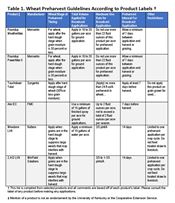|
Harvest Aid In Wheat
LEXINGTON, KY.
Cool temperatures during late-winter and early-spring delayed wheat development across much of Kentucky earlier this year. Even as recently as early May, some reports that wheat was around 5 to 7 days ‘late’ (as compared to most years) were common. Although much of the wheat is likely back to a ‘normal’ development stage due to recent record-breaking high temperatures, many producers may already be considering harvest aids in wheat.
Harvest aids remove weeds that complicate harvest and potentially stain wheat grains. Harvest aids should not be used to help a crop dry down faster.
Several products are labeled as harvest aids. A subset of those products is listed in Table 1. They are labeled for the ‘hard dough stage’ (actually ‘hard kernel stage’ or Feekes 11.3) when seeds are at 30 percent moisture or less. This stage is ‘physiological maturity,’ when seed development is complete. Harvesting before physiological maturity often reduces yield and test weight, especially in soft red winter wheat. Earlier application of glyphosate has less effect on yield on spring wheats grown in Canada and North Dakota. Some growers may be reading articles that promote earlier timings of application and those early timings apply to spring wheats, not to soft red winter wheat grown in this region.
Most products labeled for harvest aid have harvest intervals of either 7 or 14 days. This means that once the product is applied, the crop cannot be harvested until at least 7 or 14 days after application. Some products have restrictions on feeding straw to livestock, while others allow feeding straw to livestock. Some products do not allow applications on fields being grown for seed production.
If you are considering a harvest aid application in wheat, read the label of the products being considered. Follow the label. Again, the harvest aid application is best suited to removing problematic weeds. Applying a harvest aid to speed drydown will likely reduce yield and test weight. ∆

|
|